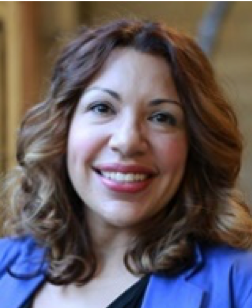
Hola/Hi, I’m Grisel M. Robles-Schrader, co-chair of the Latinx Responsive Evaluation Discourse (La RED) TIG with David Garcia.
Long before recent events in El Paso, Texas and Gilroy, California, Latina/o/x communities have been the center of political, social, and media messaging claiming that we are not legitimate, contributing members in American society and culture.
Diversity and representation in workplaces is needed to counteract recurring waves of dominant cultural hostility. In her TEDx talk, From Invisible to Invincible, journalist Maria Hinojosa explains why workplace representation matters: “We want to shape the stories of our communities and shape how history views us.”
Diverse cultural/racial/ethnic representation in workplaces creates inclusive and culturally responsive spaces. The same holds true for creating inclusive spaces of people of diverse gender identities, physical access/abilities, sexual orientations, religions, veteran status, etc.
Having mentors and role models that reflect the diverse range of Latina/o/x experiences allows us to envision our possible career paths and expands the possibility of how evaluation work is achieved. Representation influences agendas; and the languages, strategies, and approaches used to implement and disseminate our work.
Diversity in work spaces positively impacts problem solving among teams, as teams discuss a broader range of perspectives and adopt different information processing approaches (aka knowledge processing). Yet, “according to the National Center for Educational Statistics, in 2016, Hispanic women represented less than 1 percent and Hispanic males represented for 2 percent of all full time faculty in the U.S.”
Lessons Learned:
In my 20 years of community engaged work here are a few lessons I learned…
- We must be intentional about diversifying leadership and representation in our work and volunteer spaces. We are all responsible for scanning for opportunity gaps and acting as bridge builders to work towards diverse representation in these spaces.
- We must be intentional about engaging diverse community partners & stakeholders who can level up our work place diversity and inclusion policies, practices, and programs.
- We must be intentional about creating spaces where multilingualism is the norm.
- In our downtime, we must explore communities and attend community/cultural events outside of the neighborhoods we usually hang out. Learning about new cultures, communities and practices does not require a plane ticket.
- We must check-in on our colleagues and friends. In recent conversations with colleagues, worries about finances and health concern quickly moved to:
- Avoiding ICE agents along the local public transit lines.
- Anxiety that Latinx people are the focus of public mass shooting attacks.
- Fear that another hurricane will immobilize family and friends in Puerto Rico.
The political, cultural, and media landscape is affecting us, our families, and our communities. We need to be able to bring our authentic and full selves to work.
Rad Resources:
- The Society for Human Resource Management (SHRM) highlights 6 steps to build inclusive work places.
- The National Standards for Culturally and Linguistically Appropriate Services in Health and Health Care provides a framework for organizations to serve diverse communities.
To continue this discussion, debate, or dialogue email me at griselconsult@gmail.com.
The American Evaluation Association is celebrating Latina/o Responsive Evaluation Discourse TIG Week. The contributions all this week to aea365 come from LA RED Topical Interest Group members. Do you have questions, concerns, kudos, or content to extend this aea365 contribution? Please add them in the comments section for this post on the aea365 webpage so that we may enrich our community of practice. Would you like to submit an aea365 Tip? Please send a note of interest to aea365@eval.org. aea365 is sponsored by the American Evaluation Association and provides a Tip-a-Day by and for evaluators.
